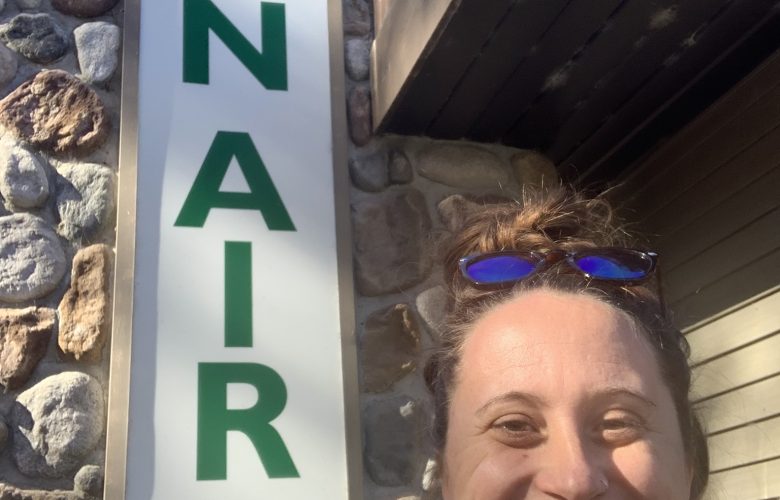Still Grinning Co-op members have been rounding up healthy food and smiles since 1996
By Emily Votruba
Current Contributor
It is a chilly, rainy Tuesday morning at 9 a.m. A group of six are waiting in the turnaround of Suz McLaughlin’s driveway on M-22, just inside Frankfort’s city limits. Someone spreads out a tarp on the wet gravel. The big United Natural Foods semi-truck is on its way, only about 15 minutes late.
Still Grinning Co-op, established in 1996, is the latest iteration of a cooperative natural food impulse in Benzie County that dates back at least to the early ’80s. It has a membership of 32 households, about 10 of which make regular monthly orders of natural and organic bulk and processed foods, ecologically sensitive cleaning and personal care products, and many other items and brands that cannot be found anywhere else in the county.
I paid my $20 non-refundable lifetime membership fee and joined up almost as soon as I heard about this co-op, back in 2010. A veteran of fierce, pioneering, labor-intensive, large food co-ops in Brooklyn and Ithaca, New York, I did not need to be sold on the idea of a no-work co-op that would save me the time, gas expense, and sticker shock of trips to Oryana Natural Foods Market, a community cooperative since 1973 in Traverse City, where I had been heading about once a week for higher-quality cat food, bulk grains and nuts, organic spices, and my special addiction: Tandoor Chef frozen Indian dinners. I also found new things! Like 10-pound bags of inky Forbidden Rice, Madagascar pink salt, Nielsen Massey vanilla extract, and organic, full culture yogurt that comes in glass or cardboard containers that are safe for freezing.
I am going to come right out and say it now—I am writing this article with one very selfish purpose: to drum up new members for our little co-op! The fact is, we are starting to have trouble meeting our total minimum order of $850 per month. (Full disclosure: both Current owner-editors are also members of Still Grinning Co-op.)
Maybe I should start by explaining what a food co-op is. In our case, it is a collectively owned store with no store-age. Once a month, one of us (McLaughlin) submits our orders online with our distributor, United Natural Foods, and then, a week later, a huge semi-truck shows up with a bunch of undivvied-up boxes and bags of stuff that we have collectively bought at wholesale prices. There is no building overhead cost, no employees, no shelving, minimal packaging, no displays, no cashiers to pay, and McLaughlin and Richard Hitchingham take care of all of the office work, bank trips, and accounting for free, so there is absolutely no mark-up for members. The only catch is that the “shopping” day is once a month, and you have to come and get your stuff and take it with you right then, or it gets rained on.*
The co-op is great if you like to plan ahead, generally know what you want, have some storage-space wiggle room, and have prioritized driving less, using less packaging, and making ecologically responsible and healthful food choices. And if you can afford the initial outlay of $95 for a 50-pound bag of organic cane sugar, you can save the extra $138 (not to mention gas money, fumes, and drive time) that it would cost you to buy the very same product a pound at a time somewhere else.
Each member has a login to the UNFI website and a virtual shopping cart. What I like to do is build my cart over the course of the month, adding and subtracting things as my whims and budget dictate. Once a month, usually on a Thursday or Friday, McLaughlin sends out a warning that our “orders are due” the following Monday. This is the time to finalize the cart and get realistic about how much kimchi I really need.
We get our delivery from the same truck that goes to Oryana and other stores in the region, and that means, almost anything you can get at the big O, you can get in McLaughlin’s driveway, except for fresh fruits and veggies. But when the truck stops for us, instead of a stock team with scanners and pallet shifters and cool uniforms, the truck driver finds a small group of moist, yawning, middle-aged people, dressed for the varied occupations that they will resume a bit later in the day, usually waiting for just a few boxes, bags, a couple of toothbrushes, and some Ayurvedic soap.
What follows is no more than 20 minutes of “Whose is this?” “Did I order that?” “Where is my… oh, there it is.” “Hey, I didn’t get my…” (If you really didn’t get your _____ [which is rare], McLaughlin makes a note to have the co-op’s longtime treasurer, Hitchingham, credit your account.) You hand McLaughlin your check, and then you go home and make towers out of your 96 rolls of unbleached recycled toilet paper.
If you are on top of what you ordered when you show up on truck day, it all goes pretty darn smoothly, and is certainly waaaaaay less work than other member co-ops, such as the Park Slope Food Co-op, which, when I was a member, required a 3-hour-and-45-minute work shift every single month, during which I would organize CLIF bars, sweep up arrowroot spills, clean bathrooms, cut cheese (literally), weigh out spices into baggies and put price stickers on them, move cases of soda around in a dank basement, and figure out how to fit boxes of escapist kumquats, three-foot collard green stalks, and rutabagas I could barely palm all onto the same sloping shelf, while getting sprayed by the produce mister every 10 minutes or so and being literally pushed around and yelled at by a consortium of left and right anarchists, nondenominational Christians, and petulant hippies. God, I miss it.
Small Is Beautiful (But Not Too Small…)
Most co-ops start small, like Still Grinning is now, and grow until they end up with a store, because most people, it is true, do not like to buy 50 pounds of rolled oats at a time, and they really do not like it when their oats get sleeted on because they had to take their kid to the doctor and the truck was late, because the roads were really bad in Bear Lake. (Usually in these rare cases, with our small friendly group, we can work something out; I can pick up for you while you take Little Betty to school, and you can pick it up from my foyer later in the day.)
“It used to be that if you were a member of any co-op in the Michigan Federation, you were a member of the others. Oryana was the first to go rogue and have its own exclusive membership structure,” McLaughlin says, explaining how the co-op landscape has changed. “We used to purchase from a co-op, a nonprofit organization of small distributors that couldn’t compete with the big conglomerates. But, one by one, they got sucked up: Blooming Prairie, North Farms out of Wisconsin. And before that, it was Michigan Federation of Food Co-ops, out of Ann Arbor.”
Benzie County is no longer quite the food desert it was when McLaughlin, Hitchingham, Will Amstutz, and several others signed on with a co-op called Lakeland in the mid-’80s. They can remember the bad old days when the dining and shopping options were much less diverse and very short on healthful and fresh, let alone organic, free range, GMO-, gluten-, or cruelty-free. Lakeland was part of a network with members in several cities. For instance, Sally Cook, a Still Grinning member now, was a Lakeland member when she and her family lived in East Lansing.
“Lakeland was very well organized, but you had to volunteer work shifts as part of your payback,” Amstutz says. “It was, at times, very cumbersome and time consuming. If you were an unloader, you unloaded, then another team did the splitting. You had to volunteer or be assigned, as a requirement. It was like, ‘Why are we spending so much time doing this?’ Part of it was the number of members—it was big. About 84 people. You couldn’t have 50 or 80 people showing up to rummage through hundreds of items, 30 people looking around saying ‘Where’s my cheese?’
So McLaughlin, Hitchingham, and Amstutz decided to go off on their own.
“‘Why are we going off on our own?’ I had to keep reminding myself, ‘Because we need to keep it simple,’” Amstutz explains. “That was my input: ‘Keep It Simple, Stupid.’ I thought it would be great to have a KISS buying club. So we organized under extremely simple principles.”
United We Divide
When it first formed in 1996, the new co-op met in various places to compile orders, receive deliveries, and then divvy up the goods. Remember, this was not exactly before the internet, but it was before most people were spending their every waking moment and a lot of their money online.
“We had one sheet with just a few things on it,” Amstutz says of those early days. “We limited it to 12 members at first. If someone dropped out, someone else could come in.”
Sally Cook remembers the meetings, where co-op members would gather to parse out shares of the bulk delivery, showing up with their own bags and jars.
“We’d have a huge tub of peanut butter. And it was the natural kind with the oil on top, so it had to be stirred first,” Cook says.
“Eventually we got smart and got a drill with a paddle on it,” McLaughlin chimes in.
“But someone still had to clean up all the oily, peanut buttery stuff afterward,” says Cook, laughing.
“And we had to do it in a public place, usually. We’ve been in some weird places,” McLaughlin says. First they met in what is now the Roadhouse restaurant building in Benzonia. Then they met at FieldCrafts, a screen-printing and embroidery business who employed a few Still Grinning members. Then they found a home at the Mills Community House. For a while, they were meeting in the basement of L’Chayim in Beulah.
Want or Need?
Cook buys all of her flour from the co-op, despite that she does not bake as much now that her kids are grown.
“I could maybe live without the co-op, but I would miss it,” Cook says. “There are still some things you can’t get in Benzie County. It takes some time to be a member of the co-op, but it takes more time to try to find some of this stuff in the stores. And sure, it’s amazing what you can get now from Amazon. But it’s a tradition in our family to belong to a co-op. Sometimes my daughter will [join in on] our order. I am always looking for something to add. Sometimes you find stuff that you end up really liking, like these canned peaches we can’t get enough of now.”
McLaughlin’s catering company, Still Grinning Kitchens, specializes in local and organic food. (The Betsie Current profiled McLaughlin and her business in a 2015 Q&A that you can read here.) She has been the co-op’s chief coordinator and order wrangler since ’96, and she is not tired of it yet.
“I do it for very personal, selfish reasons!” she says, referencing choices for both her business and her home life.
Are We Sustainable? Survey Says…
Sharron and Paul May, of The May Farm in Frankfort, have been members for 20 years, their main motivation being Oryana’s prices and distance.
“[Still Grinning Co-op is] a very grassroots, local alternative to the dominant paradigm for those of us scrappy die-hards who have chosen to cobble together an existence here,” Sharron May says.
But we are an aging co-op, full of empty nesters and some, like me, never-been-full-nesters, and even though I do at least two-thirds of my grocery shopping through the co-op, there are months when I am one of only three or four orders, and that just does not cut it. So back in August 2016, we began discussing our future. It was Sharron May who volunteered to conduct a survey of the membership—what can we do to improve the co-op, to amp up our monthly orders, and/or how can we attract more members?
She had about 10 responses to her survey. Only two people said that they “needed” the co-op (I was one). Three said it was a “want,” one said it was both, and one said it was neither! And one person said they were just in it for the opportunity to buy Traverse City-based Higher Grounds Trading Company’s coffee at a bulk discount, another service that the co-op provides, separate from our account with UNFI.
The Pros
Among the reasons cited for membership:
- The once-a-month ordering system helps with prioritizing and budgeting.
- The convenient pick-up location (for some members, it is walkable).
- The desire to avoid trips to Traverse City.
- The fact that it is much cheaper than ordering from other online outlets and paying for shipping.
- The value of participating in a cooperative effort.
- Bulk buying reduces packaging waste.
- Maintaining a well-stocked pantry of staples, especially through the winter, at very low prices.
- Continuing a family and local tradition of co-op membership.
The Cons, and Suggestions
The Tuesday morning delivery time is a challenge for some people to fit into their work schedules. It has been suggested that we find a delivery place where items can be left for an entire day without getting wet, to provide some additional flexibility. Some have suggested ordering be every two months; retiree members and those without children do not necessarily need to order every month, and some members are now out of town during the winter. Some suggested going back to having meetings where orders are split up. Some people are overwhelmed by the billions of choices and have a hard time figuring out what to order; some are put off by the ordering interface, which requires a few steps to delete cart items and does not seem to have been designed by Apple. You need some access to a computer or a smart phone to place your order, unless you join forces with an existing member.
Is Still Grinning Co-op for You?
In my opinion, this is the easiest co-op in the whole world, and we are just in an ebb tide in membership. Benzie County’s population is aging rapidly, according to the latest figures from the county’s Council on Aging. We are losing younger people, especially young families, for lots of reasons, including lack of work, and perhaps more crucially, lack of affordable housing.
On the other hand, we do not have a membership limit, it is easy (and cheap!) to join, and with no work-shift scheduling, we really could probably have a few dozen more members without creating a lot of trouble for our wonderful volunteer staff. So maybe this article will help us to keep grinning for few more months or years, by inciting a few new people to join… is that person you?
If you do not make regular trips to Traverse City for any other reason besides food shopping, this co-op could be for you. Small businesses—and not just small food businesses, like McLaughlin’s—could benefit from ordering food and green cleaning supplies in bulk. And not to worry if your housing situation is small, temporary, or precarious, there may be a way to partner with another co-op member with a large pantry who is willing to be your “store” for your orders or who may want to split an order with you, once you realize that you are never going to use all five pounds of those chia seeds.
Sure, the inventory of local stores in Benzie County has improved a lot, even since I moved here in 2010. Shop ‘n’ Save in Benzonia and Honor Family Market, to name two, are shining examples of openness to special requests, and Shop ‘n’ Save in particular stocks a terrific variety of local and organic produce and healthy convenience foods. But there are still some things I cannot find anywhere at all within 50 miles of my house, let alone at wholesale prices.
I have found my cheese. And you can have some!
Want to learn more about becoming a member of Still Grinning Co-op? Contact Suz McLaughlin at 231-352-7669 or stillgrinningkitchens@gmail.com.
*That is the theory. In reality, McLaughlin is too nice to let that happen. But there is a $5 fee assessed to people who do not show up to pick up their stuff. Again, theoretically. I am not sure it has ever been levied.




